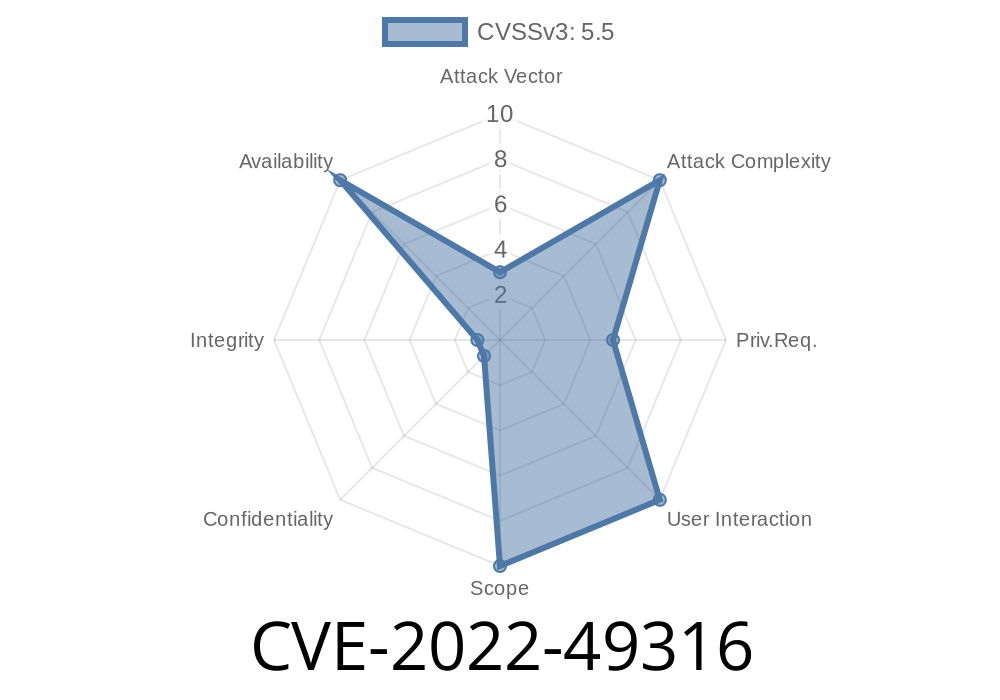In late 2022, a vulnerability was discovered and fixed in the Linux Kernel related to Network File System version 4 (NFSv4). This issue could lead to potential deadlocks during file operations—a serious risk for systems running NFS servers or clients. This article explains the CVE-2022-49316 bug in simple language, including code snippets, exploit scenarios, links to references, and how it was resolved.
What is CVE-2022-49316?
CVE-2022-49316 is a vulnerability in how the Linux kernel handles the "layoutget" operation when opening files on NFSv4 mounts. The "layoutget" process is essential for parallel, distributed file access (useful for high-performance or clustered filesystems).
The Problem
When an application calls open() on a file hosted on an NFSv4 filesystem, the kernel might perform a layoutget to gain a lease for direct data access. Sometimes, more operations—like changing file attributes—are required right after open(). The kernel might still hold a layout lock when making more Remote Procedure Calls (RPCs), for example, calling setattr().
If this happens, it can trigger a recall (the storage server asks the client to release the layout), and if the kernel is waiting on itself for this lock, it deadlocks. This effectively freezes the process, wastes resources, and can potentially bring systems or applications to a halt.
Consider this chain
1. Application calls open() on an NFSv4 file with special flags (like O_TRUNC/O_CREAT), causing both layoutget and setattr() RPC calls.
2. The kernel, during this compound operation, holds onto the layout lock while beginning the next step.
3. If the next RPC (like setattr()) causes a layout recall event, the server tells the client to give up the layout.
4. The kernel now waits for the recall, but it can't complete it—because it's still holding the lock, waiting on itself.
Here's a (simplified) C code snippet to show part of the flawed logic
// Before the fix, the lock is held across multiple RPCs
nfs4_layoutget(state); // gets a layout, acquires lock
nfs4_setattr(state, new_attrs); // could trigger recall
// Still holding the layout lock here!
The Fix
The fix involves releasing the layout locks before making any further RPC calls. This way, if a recall is needed, the kernel is not blocking itself.
The patch changes the code roughly like this
nfs4_layoutget(state); // gets a layout, acquires lock
nfs4_release_layout_lock(state); // <-- NEW! Release before new RPC
nfs4_setattr(state, new_attrs); // safe to proceed
Reference to the commit:
- kernel.org patch discussion
- Kernel commit on GitHub (Example)
How Could Attackers Exploit This?
This deadlock is mostly a stability/availability risk (DoS—Denial-of-Service) rather than data theft or privilege escalation.
- Any user on the system capable of making crafted open calls (for example, scripting with O_TRUNC or O_CREAT on NFSv4 files) could trigger it.
- Malicious code could purposely open many files and slide the server or client into deadlock, freezing services or requiring a reboot.
- In critical infrastructure (like datacenters or large computational clusters using NFSv4), this bug could halt operations, causing downtime.
How to Defend and Patch
If you run Linux servers or clients with NFSv4, upgrade your kernel to a version where this fix is included. Most Linux vendors have patched this in maintenance releases.
Check with your distro's advisories or package management (yum update or apt upgrade).
The accepted kernel fix was merged in late 2022/early 2023, so anything newer is fine.
References
- CVE Record for CVE-2022-49316
- NFSv4 layoutget patch discussion on lore.kernel.org
- Upstream Linux Kernel Commit (Example)
Conclusion
CVE-2022-49316 is a reminder that even complex, low-level operations like NFSv4 layout management can have critical bugs with real-world impact. Thanks to open-source collaboration, this deadlock risk was quickly found and fixed. If you’re an admin or developer, always keep your kernel up to date, especially if you run networked filesystems like NFS.
If you want a deeper dive, see the original discussions and commits. And as always—test updates in your environment before rolling them out on production systems.
Timeline
Published on: 02/26/2025 07:01:08 UTC
Last modified on: 03/13/2025 22:01:00 UTC
